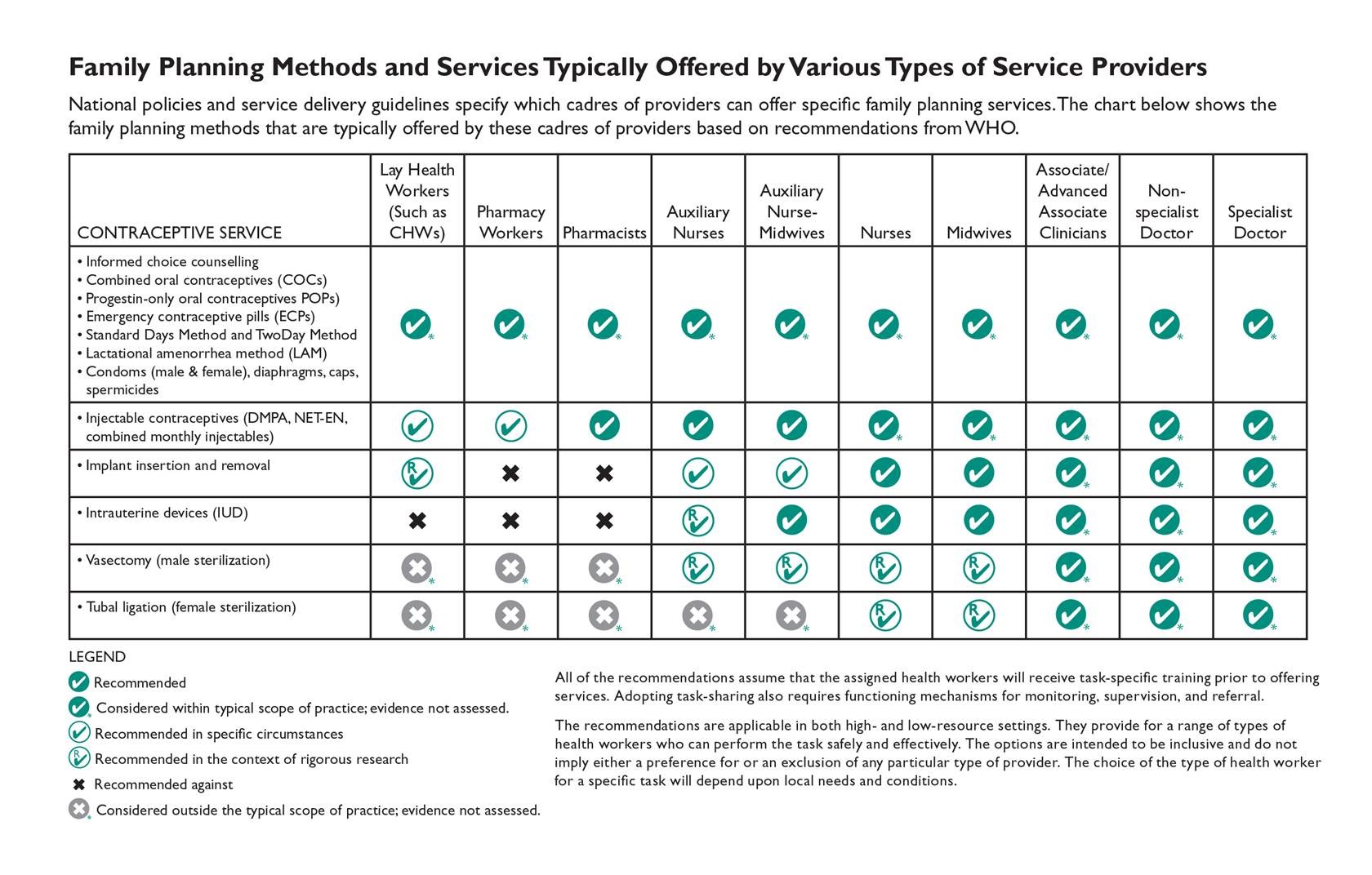Chapter 26
Who Provides Family Planning?
Many different people can learn to inform and advise people about family planning and to provide family planning methods. When more types of health workers are authorized and trained to provide family planning methods, more people have access to them.
The types of health care providers who can and do provide family planning include the following:
|
Type of Health Worker |
Examples |
|---|---|
| Specialist doctor |
|
| Non-specialist doctor |
|
| Advanced associate and associate clinician |
|
| Midwives |
|
| Nurse |
|
| Auxiliary nurse-midwife |
|
| Auxiliary nurse |
|
| Pharmacist |
|
| Pharmacy worker |
|
| Lay health worker |
|
| User/self |
|
In addition, some methods can be offered by health workers but do not require health workers. For example, condoms are sold in shops and by vendors and in vending machines. Also, lay health workers in the community and experienced and successful users can teach others how to use their method—for example, fertility awareness methods, male and female condoms, LAM, and withdrawal—and they can support and advise new users of many other methods. Users of injectables can learn to give themselves injections with a special formulation of DMPA in the Uniject delivery device (see Chapter 4 – Progestin-Only Injectables, Self-injection Can Be an Option). Programs can support self-injection with information and training, strong referral links to health care providers, and monitoring and follow-up.
Task-sharing: WHO recommendations
Many countries and programs are changing their policies or regulations to allow more types of providers to offer contraceptive methods—a change known as task-sharing. Task-sharing refers to expanding the levels of health care providers who can appropriately deliver health services. Task-sharing helps to:
- address shortages and uneven distribution of providers, particularly in rural and remote areas
- give higher-level clinicians more time to use their specialized skills
- provide more family planning methods at the primary care level, and
- overall, increase access to safe and timely care
To encourage and guide task-sharing, WHO has developed recommendations on which types of health workers can safely and effectively provide specific family planning methods. WHO based these recommendations on evidence that a wide variety of providers can safely and effectively provide contraception. The table on the next page summarizes the WHO recommendations.
Specific competency-based training and continued educational support help all types of health care providers do a better job at providing family planning. They are particularly important when providers take on new tasks. Some tasks and some providers require more training and support than others. Training needs to cover skills in informing and counseling clients about choosing and using specific methods, including their side effects, as well as any specific technical skills such as how to give injections or insert and remove an IUD or an implant. Even specialist doctors need training in specific techniques—for example, no-scalpel vasectomy and laparoscopic tubal sterilization. Checklists and other job aids can help a wide range of providers and managers in various ways, such as screening clients for medical eligibility criteria, making sure all steps in a process are carried out (such as infection prevention), and ensuring good quality of services.
As programs plan for task-sharing and carrying it out, maintaining quality and safety are the top concerns. Successful task-sharing requires that a program pay attention to:
- training and support
- supplying the new providers with the method
- supervision
- referral for managing any complications
- changes to protocols, regulations, and training programs
- salaries or payment that reflect the providers’ scope of practice.
Family Planning Methods and Services Typically Offered by Various Types of Service Providers
